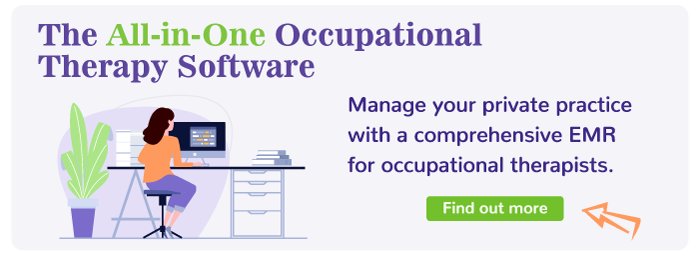Starting an occupational therapy private practice

Starting your own occupational therapy private practice requires a broad base of knowledge. You’ll need to understand business planning, legalities, insurance and credentialing, manage administrative needs, strategically choose a practice location, market your practice and establish mentorships.
If you're a business-savvy occupational therapist wanting to contribute to your community by helping meet unmet needs, an occupational therapy private practice may be for you. Depending on the services provided, one OT private practice may look and operate completely different than another. However, several essential components are necessary to get underway.

Business Planning
The first step is often to consider your vision for your occupational therapy private practice. What population do you want to serve? Will you be utilizing direct service, consultation, or something else? A market analysis can be a useful tool in business planning as it can:
- Provide facts that will help you analyze whether your services are appropriate for the community.
- Help you understand the population you are intending to serve alongside community demographics like average age and income, and population density.
- Define direct and indirect competition and whether another occupational therapy private practice is already meeting the needs in the community you are looking to serve.
All of this can be summed up in a SWOT analysis. SWOT is an acronym that stands for strengths, weaknesses, opportunities, and threats. SWOTs help you consider finances, location, and available resources to create an overall picture of where you stand on beginning your occupational therapy private practice. Therapists can conduct a SWOT analysis in the early stages of transitioning to an occupational therapy private practice.
Legalities
Rules regarding starting a business (such as occupational therapy private practice) will vary state-by-state. The Small Business Association and your local or national occupational therapy associations can be excellent resources. You will need to maintain your occupational therapy license and fulfill any continuing education units that your state requires. A private practitioner will need professional liability insurance to protect both you and your clients. All communications must always be HIPAA compliant.
Save time by streamlining your billing. Download our free Ultimate Guide for Insurance Billing now.
Get Credentialed
Many clients will be interested in paying for services with their medical insurance. To get reimbursed, you will need to join insurance provider panels. This can take several months and you will only be able to apply to panels that are accepting occupational therapists in your geographical area. The Council for Affordable Quality Healthcare, most often known as CAQH, provides a comprehensive initial application that is used by several private payors. This is often the first step in becoming credentialed by third parties and is a good place to start. While you go through the often lengthy process of credentialing, consider accepting private pay, HSA/FSA, or a sliding-scale system to start filling your schedule. Accepting a variety of payment methods in your occupational therapy private practice is important because it makes your services accessible to more clients.

Download free private practice checklist
Find a space…. Or not!
Several private practice OTs do not have a physical location when they begin. Many opportunities are available to be an independent clinician without an actual clinic space. This includes home health across the lifespan, telehealth, and independent contracting. Other therapists join together to share a space among a variety of health professionals.
If you are ready for your own space to treat clients, several considerations should be addressed when selecting the perfect practice location. The occupational therapy private practice office should have a waiting area that allows you to comply with HIPAA regulations in addition to:
- A safe area outside
- A clean bathroom; and
- Adequate privacy for more than one client in the clinic at once.
Accessibility is also critical within our practice field and basic American Disabilities Act compliance should be considered. Examples include:
- Ramps
- First floor access or an elevator
- Bathroom accessibility
- Wide aisles to navigate the space
- Handicap parking

Marketing your occupational therapy private practice
Marketing is how you’ll get out the news about your new occupational therapy private practice. If you made a thorough business plan you will already have an idea of what clients and referral sources you will need to target.
Logos: Create a recognizable logo with your practice name which can be used for printed advertisements, signage, social media, business cards and more.
Networking: An especially effective way for occupational therapists to market is by becoming involved in the community. Speak at conferences, join the local chamber of commerce, and arrange time to meet with referrers to introduce yourself and the services you provide.
Word of mouth: Of course, providing consistently excellent services to your clients is a great way to get free marketing by word-of-mouth.
Check out our marketing ideas for your private practice
If providing telehealth occupational therapy services, you may find this free teletherapy e-book useful. It covers everything from setting up your office for telehealth through marketing your teletherapy services.
Find a space…. Or not!Connect with a Mentor
Navigating your occupational therapy private practice for the first time can be challenging. Rules and legislation are fluid and vary between states. If possible, connect with a mentor who practices in your state. They can connect you to resources, networking groups, and answer questions that you will inevitably run into.
Start 30-day Free Trial and explore TheraPlatform. HIPAA Compliant Video and Practice Management Software for Therapists.
Policies and Paperwork
Paperwork is a significant endeavor for an OT transitioning to private practice. Clearly defining policies and keeping track of your documentation, consent forms, referrals, invoices, and other paperwork gives you credibility and a professional edge. Define expectations for your clients (will you charge for no-shows?) and any therapists you may hire. Organization and selection of a system that works for you as a practitioner is essential. An EHR system can fill in this need. TheraPlatform is an all-in-one system that includes the ability to schedule, document, submit insurance claims, allow the client to fill out forms, to conduct telehealth vis their built in video conferencing and more.

Summary
Occupational therapy private practice can be a fulfilling way to make a difference in your community. Coming up with a solid plan, accepting a variety of pay sources, making connections, and being consistent and organized can help you reach success on your new endeavor.
TheraPlatform is offering a 30-day free trial for their all-in-one EHR service. No credit card required. Sign up to explore the administrative features for managing an occupational therapy private practice including intake and consent forms, client scheduling, billing, HIPAA-compliant messaging and video conferencing, daily documentation, e-claim submissions and more. TheraPlatform also offers several unique teletherapy features including a whiteboard, screen sharing, interactive games and more. TheraPlatform, an all-in-one EHR, practice management and teletherapy tool was built for therapists to help them save time on admin tasks. Sign up for a free, 30-day trial with no credit card required. Cancel anytime.
More resources
- Therapy resources and worksheets
- Therapy private practice courses
- Ultimate teletherapy ebook
- The Ultimate Insurance Billing Guide for Therapists
- The Ultimate Guide to Starting a Private Therapy Practice



